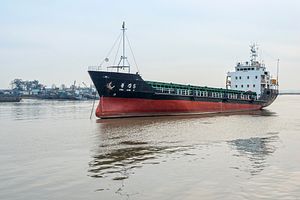Initial signs show that China is tightening controls on economic contact with North Korea in response to newly passed UN Security Council sanctions. Notably, the sanctions call for all cargo heading to or from North Korea to be inspected for contraband, and for a halt on imports of North Korean coal and iron when the proceeds will be used to further Pyongyang’s nuclear program.
As with each round of sanctions passed on North Korea, the million-dollar question is how strictly China – Pyongyang’s top trading partner — will enforce the new restrictions. So far, Beijing is showing signs of stepping up restrictions on its economic ties with North Korea, in line with the new sanctions.
Reuters reports that China’s Ministry of Transport has blacklisted 31 North Korean vessels in accordance with the UN Security Council resolution. Since then, at least three ships have anchored briefly off of Chinese ports before sailing away – apparently denied access by Chinese authorities. In the most recent example, the North Korean cargo ship Grand Karo was barred from docking at Rizhao port in China’s Shandong province.
Meanwhile, the South Korean newspaper Chosun Ilbo reported that China had stopped importing coal from North Korean in early March, before the UN sanctions had even officially passed. Banks in Dandong, a Chinese city near the North Korean border, had also apparently been ordered to halt remittances to North Korea, according to information provided to Chosun Ilbo by a bank worker.
South Korea’s Yonhap News, citing “a diplomatic source with knowledge of North Korea-China relations,” said that daily shipments passing across the Sino-North Korean border had dropped by 20 to 30 percent since the sanctions were approved.
After the last round of UN sanctions on North Korea, in 2013, China’s trade with North Korea was largely unaffected, Reuters found.
In 2016, slowing trade with North Korea – and particularly slowing coal imports – may be driven by more than just UN action. After all, China’s global imports dropped 14 percent in 2015, a symptom of slow economic growth at home and abroad. Meanwhile, China’s push to clean up air pollution and transition toward renewable energy has meant a corresponding drop in coal imports. Thanks to slower demand and increased competition from China’s domestic coal production, China’s total coal imports plunged 30 percent in 2015 and are expected to drop again this year. In other words, it’s likely China’s imports from North Korea would face an uphill battle – even without the sanctions.
Chinese officials have repeatedly pledged to uphold the latest round of UN sanctions. “We have the obligation and capability to implement all the resolutions passed by the Security Council, including Resolution 2270,” Foreign Minister Wang Yi said at his annual press conference on Tuesday.
However, he also emphasized that sanctions are only one part of the resolution — “it also reiterates support for the Six-Party Talks and asks the parties to refrain from taking any actions that might aggravate tensions,” Wang explained. “So in China’s view, the resolution must be implemented in its entirety.”
“To have blind faith in sanctions and pressure would, in effect, be irresponsible to the future of the Peninsula,” Wang concluded.

































